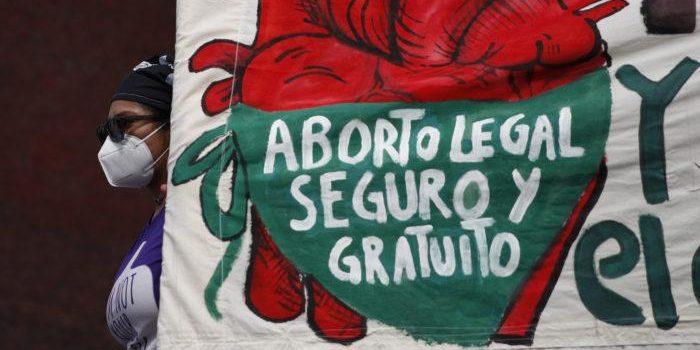(Headline USA) As pro-abortion left-wingers consider permanently fleeing the United States over worries that a federal abortion ban may one day restrict their right to promiscuous, unprotected sexual intercourse, the porous southern border may prove to be a godsend.
Only, this time, the immigration may be flowing in the reverse direction, sending shiftless and irresponsible undesirables southward where the may be guaranteed unfettered access to abortions that are legal, safe—and possibly even free.
A Mexican Supreme Court decision to end the federal ban on abortion extended a regional trend of increasing access to the procedure, but left in place a patchwork of varying state restrictions.
The high court on Wednesday threw out all federal criminal penalties for abortion, in a ruling that will require the federal public health service to offer the procedure to anyone who requests it.
That will mean access for millions of Mexicans since the social security service and other federal institutions provide health care to most people who work in the formal economy.
Some 20 Mexican states, however, still criminalize abortion. Those laws were not affected by the Supreme Court ruling, but abortion advocates will likely ask state judges to follow its logic.
Abortions are not widely prosecuted as a crime in Mexico, but many doctors refuse to provide them, citing the law.
Celebration of the ruling soon spilled out onto social media.
“Today is a day of victory and justice for Mexican women!” Mexico’s National Institute for Women wrote in a message on Twitter. The government organization called the decision a “big step” toward gender equality.
Sen. Olga Sánchez Cordero, a former Supreme Court justice, applauded the ruling, saying that it represented an advance toward “a more just society in which the rights of all are respected.”
She called on Mexico’s Congress to pass legislation in response.
But others in the highly religious country decried the decision. Irma Barrientos, director of the Civil Association for the Rights of the Conceived, said opponents will continue the fight against expanded abortion access.
“We’re not going to stop,” Barrientos said. “Let’s remember what happened in the United States. After 40 years, the Supreme Court reversed its abortion decision, and we’re not going to stop until Mexico guarantees the right to life from the moment of conception.”
In its ruling, the Mexican court said that “the legal system that criminalized abortion” in federal law was unconstitutional because it “violates the human rights of women and people with the ability to gestate.”
The decision came two years after the court ruled that abortion was not a crime in one northern state. That decision set off a slow state-by-state process of decriminalizing it.
Last week, the central state of Aguascalientes became the 12th to drop criminal penalties.
Abortion activists will have to continue seeking legalization state by state, though Wednesday’s decision should make that easier. State legislatures can also act on their own to erase abortion penalties.
For now, the ruling does not mean that every Mexican woman will be able to access the procedure immediately, explained Fernanda Díaz de León, sub-director and legal expert for women’s rights group IPAS.
What it does do—in theory—is obligate federal agencies to provide the care to patients. That’s likely to have a cascade of effects.
Díaz de León said removing the federal ban takes away another excuse used by care providers to deny abortions in states where the procedure is no longer a crime.
It also allows women with formal employment who are part of the social security system and government employees to seek the procedure in federal institutions in states where the abortion is still criminalized, she said.
Díaz de León and officials at other feminist organizations worry that women, particularly in more conservative areas, may still be denied abortions.
“It’s a very important step,” Díaz de León said. But “we need to wait to see how this is going to be applied and how far it reaches.”
Mexico City was the first Mexican jurisdiction to decriminalize abortion 16 years ago.
Observers in Mexico agreed that it would take time to see how Wednesday’s ruling is applied.
In the southern state of Guerrero, Marina Reyna, director of the Guerrero Association Against Violence toward Women, cautioned that challenges would persist. Her state decriminalized abortion last year, but there are 22 open investigations against women accused of ending their pregnancies.
“There is still a lot of resistance,” she said.
Meanwhile, U.S. women have an array of options to choose from even after the overturn of Roe v. Wade triggered a raft of so-called heartbeat laws from red states—and, in some cases, activated laws that had been in place before the 50-year-old decision legalized abortion nationwide during the peak of the 1970s “free love” movement.
Across Latin America, countries have made moves to lift abortion restrictions in recent years, a trend often referred to as a “green wave,” in reference to the green bandanas carried by women protesting for abortion rights in the region.
After decades of work by activists across the region, the trend picked up speed in Argentina, which in 2020 legalized the procedure. In 2022, Colombia, a highly conservative country, did the same.
Adapted from reporting by the Associated Press

